06 Apr2015
By Sharon Robinson
News Flash! The interest of students and their opportunity to learn is not better or even well served by a strategy of constant and high demand of inexperienced teachers. Retention matters, not just to teachers but, most critically, to students.
Recent studies showing that teacher effectiveness continues to develop over time reinforce this imperative to do right by our students. First, in a working paper completed last year for the National Center for Analysis of Longitudinal Data in Education Research, researchers at Duke University found that middle school teachers’ effect on student test scores as well as attendance rates improves over at least several years. A subsequent study out of Brown University found improvement in teacher effectiveness is indeed steepest in the early years in the classroom but continues for many more years, challenging the common perception that teacher quality is a fixed characteristic after just a couple of years of experience.
23 Mar2015
By Donna Sacco, Amanda Bush and Christine DeGregory
In the three decades since A Nation at Risk was released, the state of America’s education system relative to other countries’ has been a matter of heated debate. Along the way, public opinion has placed the onus for our schools’ perceived failure on teachers and their preparation, and education policy has echoed this assumption through an array of accountability measures for teachers and preparation programs.
One driver of the continued misconception about U.S. teacher quality is the highly publicized results of international large-scale education assessments (ILSAs) that suggest America’s students are performing far below other nations. At January’s press briefing for the report The Iceberg Effect, lead researcher and report author James Harvey explained that ILSAs have been misused and that the science behind them is highly questionable, akin to comparing apples to oranges.
17 Feb2015
By Kabba Colley, Kathryn C. McGinn and Anthony Pittman
Editor’s Note: AACTE’s two Research Fellowship teams will present a joint session at the Association’s Annual Meeting, Saturday, February 28, at 1:30 p.m. in Room A704 of the Atlanta Marriott Marquis. This post provides background on the fellowship based in New Jersey at Kean University, Rowan University, and William Paterson University.
Is there a difference in teacher persistence in urban districts attributable to specific pathways? Why do teachers say they persist in urban districts? Researchers from Kean University, Rowan University, and William Paterson University came together to explore these and other related questions as part of the AACTE Research Fellowship.
16 Feb2015
By Amy Johnson and Cathie Fallona
Editor’s Note: AACTE’s two Research Fellowship teams will present a joint session at the Association’s Annual Meeting, Saturday, February 28, at 1:30 p.m. in Room A704 of the Atlanta Marriott Marquis. This post provides background on the fellowship at the University of Southern Maine.
The recent release of proposed federal reporting requirements for educator preparation programs stirred up intense interest in the methods and metrics used to evaluate programs. As many people noted in their letters of comment to the U.S. Department of Education earlier this month, several of the proposed new measures are unprecedented and would require investment of significant time and money to collect, analyze, and report data on an annual basis.
10 Feb2015
By Andrea Whittaker
The Stanford Center for Assessment, Learning, and Equity (SCALE) is excited to share the edTPA Review of Research on Teacher Education, developed by SCALE with input from educators and researchers to identify foundational research literature that informs the development of edTPA.
The literature cited provides a research foundation for the role of assessment in teacher education, for the common edTPA architecture, and for each of the 15 shared rubric constructs.
03 Feb2015
By Amanda Bush, Christine DeGregory and Donna Sacco
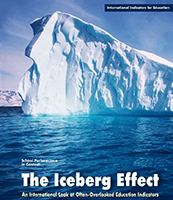
Upon arriving at AACTE last month to begin our semester-long internship, we were whisked off to the National Press Club for a press briefing on The Iceberg Effect, based on the new studySchool Performance in Context: Indicators of School Inputs and Outputs in Nine Similar Nations. For three doctoral students who are dedicated to promoting social justice in and out of the classroom, this could not have been a more fitting introduction to our work at AACTE.
The report, released by the National Superintendents Roundtable and the Horace Mann Foundation, casts new light on U.S. students’ performance on international assessments, controlling for social and economic factors that have not been previously studied alongside student achievement on this scale. The results highlight the relatively strong academic achievement of America’s students in spite of our nation’s poor performance in providing supports to help offset the widespread social and economic effects of poverty.
03 Feb2015
By AACTE
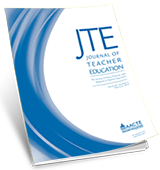
AACTE is pleased to announce Michigan State University’s College of Education as the next editorial host of the Journal of Teacher Education (JTE). The editors were selected through a competitive proposal process and approved by the Association’s Board of Directors for a 3-year term.
The current editorial team at Pennsylvania State University, which has served the JTE since August 2010, will continue work on the journal through June 2015 to complete Volume 66; however, the Michigan State team will receive all new manuscript submissions effective March 1.
25 Nov2014
By Kristin McCabe
A study of 30 teacher residency programs funded through the federal Teacher Quality Partnership (TQP) Program finds that graduates of the residencies feel more prepared at the start of their careers and more supported during their time in the classroom than their same-district peers from other pathways.
09 Sep2014
By Kristin McCabe
 The AACTE Committee on Research and Dissemination invites proposals for a campus-based team to edit the Journal of Teacher Education (JTE) for a 3-year term, commencing with Volume 67, Issue 1 (January/February 2016). Proposals must be submitted online by November 7. Qualified individuals from schools, colleges, and departments of education at AACTE member institutions may apply.
The AACTE Committee on Research and Dissemination invites proposals for a campus-based team to edit the Journal of Teacher Education (JTE) for a 3-year term, commencing with Volume 67, Issue 1 (January/February 2016). Proposals must be submitted online by November 7. Qualified individuals from schools, colleges, and departments of education at AACTE member institutions may apply.
Click here to download the complete request for proposals, or click here to enter the online submission site.
02 Sep2014
By Kristin McCabe
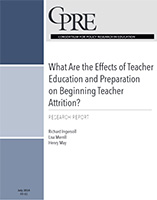 Preservice preparation in teaching methods and pedagogy has a notably positive effect on new teachers’ likelihood to stay past their first year on the job, according to a new report out of the Consortium for Policy Research in Education (CPRE). Teachers’ routes to licensure, certificate types, degrees, and selectivity of their colleges have much less correlation with attrition, say report authors Richard Ingersoll, Lisa Merrill, and Henry May.
Preservice preparation in teaching methods and pedagogy has a notably positive effect on new teachers’ likelihood to stay past their first year on the job, according to a new report out of the Consortium for Policy Research in Education (CPRE). Teachers’ routes to licensure, certificate types, degrees, and selectivity of their colleges have much less correlation with attrition, say report authors Richard Ingersoll, Lisa Merrill, and Henry May.
Analyzing data from the national Schools and Staffing Survey and supported by a National Science Foundation grant, the authors studied to what degree various elements of preservice preparation contribute to beginning teachers’ attrition or retention after 1 year in the classroom, particularly in the fields of mathematics and science.
21 Jul2014
By Kristin McCabe
 AACTE has awarded its inaugural Research Fellowship in Educator Preparation to teams based at the University of Southern Maine and at William Paterson University of New Jersey. The 1-year fellowships commence August 1.
AACTE has awarded its inaugural Research Fellowship in Educator Preparation to teams based at the University of Southern Maine and at William Paterson University of New Jersey. The 1-year fellowships commence August 1.
Each of the two research teams, which include emerging as well as experienced scholars, will receive $30,000 to support projects examining critical issues in educator preparation.
08 Jul2014
By Kristin McCabe
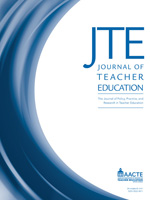 The editors of AACTE’s Journal of Teacher Education invite manuscripts for a special issue on school-based teacher learning. Manuscripts are due November 1, and the issue will be published next year as Volume 66, Number 4 (September/October 2015).
The editors of AACTE’s Journal of Teacher Education invite manuscripts for a special issue on school-based teacher learning. Manuscripts are due November 1, and the issue will be published next year as Volume 66, Number 4 (September/October 2015).
Coeditors Stephanie Knight, Gwendolyn Lloyd, and Fran Arbaugh of Pennsylvania State University have issued the following call for papers with suggested research questions:
Much of what teachers learn about teaching and learning occurs in school-based contexts. Opportunities for teacher learning occur along the professional continuum, from preservice field experiences to a multitude of opportunities for in-service teachers to engage in job-embedded learning. In addition, school-based teacher education is supported by various types of teacher educators—including, but not limited to, mentors, university supervisors, peers, instructional coaches, administrators, district-level supervisors, university faculty, and other professional development providers.
08 May2014
By Saroja Barnes
Clinically based educator preparation is the focus of the first installment of AACTE’s new Research-to-Practice Spotlight Series, now available on the Innovation Exchange web site.
This series, part of AACTE’s Innovation Exchange, connects research on educator preparation with practice in the field. Each installment in the series contains videos of interviews with researchers, teacher educators, and practitioners on relevant topics in educator preparation, as well as a set of accompanying resources such as research articles and studies and examples of related innovative practices in the field.
01 May2014
By Jessica Milton
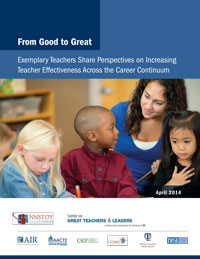 How does the profession support teachers’ development over time? Addressing that question from a collaborative approach, a new report was released yesterday by the National Network of State Teachers of the Year in partnership with the Center on Great Teachers and Leaders at American Institutes for Research and five other national education organizations, including AACTE. The Council of Chief State School Officers hosted a release event featuring a panel discussion by teacher leaders, researchers, and policy makers about the report’s findings.
How does the profession support teachers’ development over time? Addressing that question from a collaborative approach, a new report was released yesterday by the National Network of State Teachers of the Year in partnership with the Center on Great Teachers and Leaders at American Institutes for Research and five other national education organizations, including AACTE. The Council of Chief State School Officers hosted a release event featuring a panel discussion by teacher leaders, researchers, and policy makers about the report’s findings.
Insights in the report, From Good to Great: Exemplary Teachers Share Perspectives on Increasing Teacher Effectiveness Across the Career Continuum, are based on an exploratory survey of more than 300 former national and state teachers of the year. This research identifies valuable professional experiences and supports that were essential to these exemplar teachers’ professional growth and effectiveness throughout various stages of their career. Teachers responded to survey questions relevant to four stages of the teacher career continuum, identified as the preservice, novice, career, and teacher leader stages.
04 Feb2014
By Kristin McCabe
 The March/April 2014 issue of the Journal of Teacher Education (JTE) is now available online. See what Volume 65 Number 2 has to offer!
The March/April 2014 issue of the Journal of Teacher Education (JTE) is now available online. See what Volume 65 Number 2 has to offer!
- In this month’s editorial, “Research as a Catalyst for Change,” JTE‘s editors at Penn State University relate the issue’s contents to AACTE’s 66th Annual Meeting theme, Taking Charge of Change. Heralding the theme as an opportunity to champion the role of research in informing policy and practice, the editors highlight the articles’ contributions to knowledge about innovative practices in the development of both preservice and in-service educators.









 Preservice preparation in teaching methods and pedagogy has a notably positive effect on new teachers’ likelihood to stay past their first year on the job, according to a
Preservice preparation in teaching methods and pedagogy has a notably positive effect on new teachers’ likelihood to stay past their first year on the job, according to a  AACTE has awarded its inaugural
AACTE has awarded its inaugural  The editors of AACTE’s
The editors of AACTE’s  How does the profession support teachers’ development over time? Addressing that question from a collaborative approach, a new report was
How does the profession support teachers’ development over time? Addressing that question from a collaborative approach, a new report was